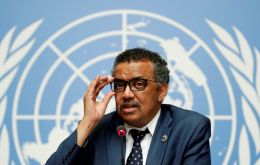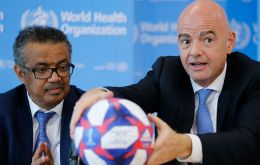MercoPress. South Atlantic News Agency
Tag: WHO
-
Friday, January 24th 2020 - 08:46 UTC
Coronavirus outbreak has become a global health emergency; WHO cautious, “it's a bit too early”

The World Health Organization (WHO) said on Thursday it was “a bit too early” to declare a new coronavirus a global health emergency as China put millions of people on lockdown amid an outbreak that has killed 25 people and infected more than 800.
-
Thursday, January 9th 2020 - 09:22 UTC
WHO growing concern with a possible new coronavirus outbreak in China

A cluster of more than 50 pneumonia cases in the central Chinese city of Wuhan may be due to a newly emerging member of the family of viruses that caused the deadly SARS and MERS outbreaks, World Health Organization (WHO) said on Wednesday.
-
Friday, November 22nd 2019 - 07:16 UTC
Stand up and exercise, WHO tells adolescents in its latest report on obesity

Teenagers worldwide are jeopardizing their health by failing to get enough exercise to reduce their risk of obesity and cardiovascular diseases, a World Health Organization-led study released on Friday warns.
-
Wednesday, November 6th 2019 - 09:03 UTC
WHO recommends 15 minutes daily walking to improve productivity and life expectancy

The world economy could be boosted by as much as US$100 billion a year if employers successfully encouraged their staff to meet World Health Organization guidelines on exercise, according to an analysis of the economic impact of the activity.
-
Thursday, October 17th 2019 - 09:05 UTC
Universal Health Coverage passes key global milestone

The World Health Organization welcomed a new Inter-Parliamentary Union (IPU) Resolution on achieving Universal Health Coverage (UHC) by 2030. The resolution, adopted at the IPU Assembly in Belgrade, Serbia, comes one month after heads of state agreed on a high-level United Nations Political Declaration on UHC in New York.
-
Saturday, October 12th 2019 - 09:04 UTC
Measles and “immunization gap” causing an alarming upsurge of the disease

Measles is staging a devastating comeback in epidemics across the world as the virus exploits dangerous gaps in vaccination coverage, World Health Organization (WHO) experts said.
-
Wednesday, October 9th 2019 - 09:47 UTC
World Sight Day: 2.2 billion people have vision impairment or blindness

More than 1 billion people worldwide are living with vision impairment because they do not get the care they need for conditions like short and farsightedness, glaucoma and cataract, according to the first World report on vision issued by the World Health Organization.
-
Saturday, October 5th 2019 - 09:10 UTC
WHO and FIFA agree to promote healthy life-styles through football globally

The World Health Organization (WHO) and football’s world governing body, FIFA, agreed on Friday a four-year collaboration to promote healthy lifestyles through football globally. WHO Director-General Dr Tedros Adhanom Ghebreyesus and FIFA President Gianni Infantino signed the memorandum of understanding at WHO’s Geneva-based headquarters. “WHO is excited to be working with FIFA. Half the world watched the 2018 World Cup. This means there’s huge potential for us to team up to reach billions of people with information to help them live longer healthier lives,” said Dr Tedros.
-
Wednesday, October 2nd 2019 - 09:11 UTC
WHO launches digital app to improve care for older people

On the International Day of Older Persons, October first, the World Health Organization (WHO) is launching a package of tools, including a digital application to help health and social workers provide better care for older people.
-
Tuesday, June 18th 2019 - 08:45 UTC
Billions suffer from poor access to water, sanitation and hygiene, says Unicef and WHO report

Billions of people around the world are continuing to suffer from poor access to water, sanitation and hygiene, according to a new report by UNICEF and the World Health Organization. Some 2.2 billion people around the world do not have safely managed* drinking water services, 4.2 billion people do not have safely managed sanitation services, and 3 billion lack basic** hand-washing facilities.
